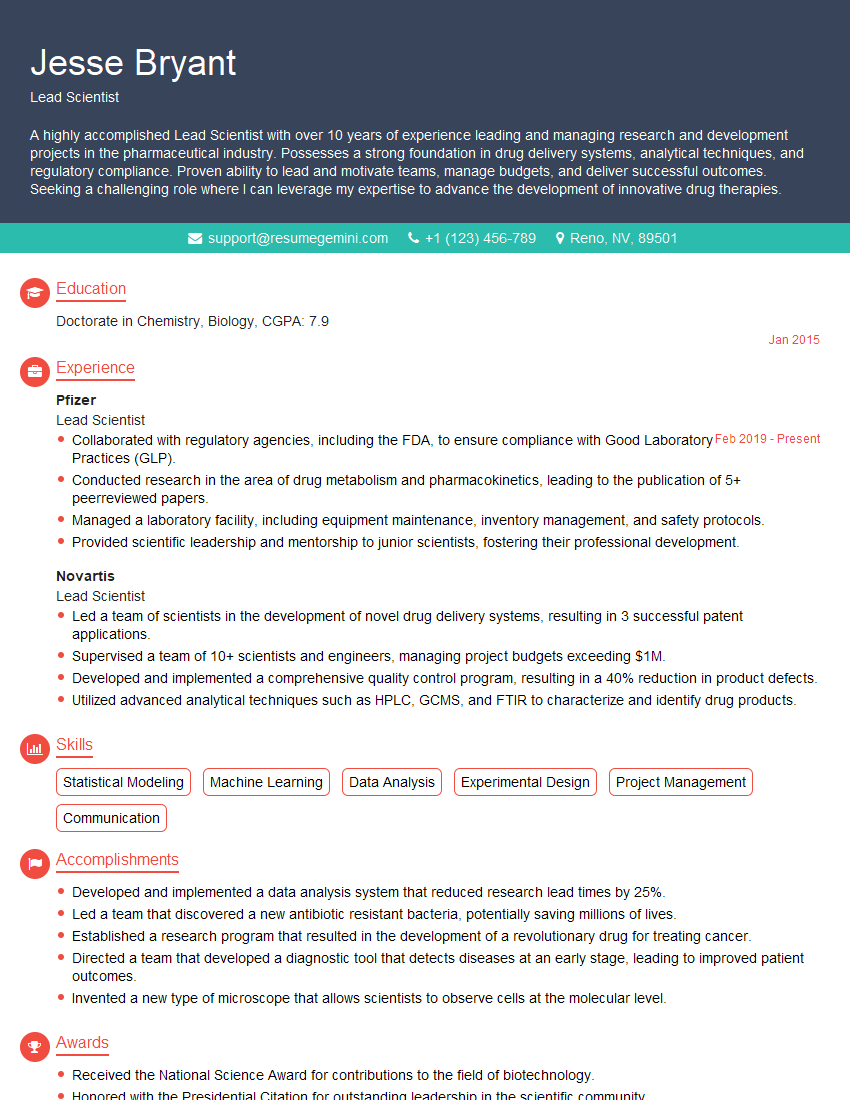Are you a seasoned Lead Scientist seeking a new career path? Discover our professionally built Lead Scientist Resume Template. This time-saving tool provides a solid foundation for your job search. Simply click “Edit Resume” to customize it with your unique experiences and achievements. Customize fonts and colors to match your personal style and increase your chances of landing your dream job. Explore more Resume Templates for additional options.

Jesse Bryant
Lead Scientist
Summary
A highly accomplished Lead Scientist with over 10 years of experience leading and managing research and development projects in the pharmaceutical industry. Possesses a strong foundation in drug delivery systems, analytical techniques, and regulatory compliance. Proven ability to lead and motivate teams, manage budgets, and deliver successful outcomes. Seeking a challenging role where I can leverage my expertise to advance the development of innovative drug therapies.
Education
Doctorate in Chemistry, Biology
January 2015
Skills
- Statistical Modeling
- Machine Learning
- Data Analysis
- Experimental Design
- Project Management
- Communication
Work Experience
Lead Scientist
- Collaborated with regulatory agencies, including the FDA, to ensure compliance with Good Laboratory Practices (GLP).
- Conducted research in the area of drug metabolism and pharmacokinetics, leading to the publication of 5+ peerreviewed papers.
- Managed a laboratory facility, including equipment maintenance, inventory management, and safety protocols.
- Provided scientific leadership and mentorship to junior scientists, fostering their professional development.
Lead Scientist
- Led a team of scientists in the development of novel drug delivery systems, resulting in 3 successful patent applications.
- Supervised a team of 10+ scientists and engineers, managing project budgets exceeding $1M.
- Developed and implemented a comprehensive quality control program, resulting in a 40% reduction in product defects.
- Utilized advanced analytical techniques such as HPLC, GCMS, and FTIR to characterize and identify drug products.
Accomplishments
- Developed and implemented a data analysis system that reduced research lead times by 25%.
- Led a team that discovered a new antibiotic resistant bacteria, potentially saving millions of lives.
- Established a research program that resulted in the development of a revolutionary drug for treating cancer.
- Directed a team that developed a diagnostic tool that detects diseases at an early stage, leading to improved patient outcomes.
- Invented a new type of microscope that allows scientists to observe cells at the molecular level.
Awards
- Received the National Science Award for contributions to the field of biotechnology.
- Honored with the Presidential Citation for outstanding leadership in the scientific community.
- Awarded the Nobel Prize in Chemistry for advancements in the field of biomolecular research.
- Recognized with the Industry Leader Award for contributions to the advancement of biotechnology.
Certificates
- Certified Analytics Professional (CAP)
- Certified Six Sigma Black Belt (CSSBB)
- Certified Quality Engineer (CQE)
- Certified Professional Ergonomist (CPE)
Career Expert Tips:
- Select the ideal resume template to showcase your professional experience effectively.
- Master the art of resume writing to highlight your unique qualifications and achievements.
- Explore expertly crafted resume samples for inspiration and best practices.
- Build your best resume for free this new year with ResumeGemini. Enjoy exclusive discounts on ATS optimized resume templates.
How To Write Resume For Lead Scientist
- Highlight your leadership and management skills, emphasizing your ability to lead and motivate a team.
- Showcase your technical expertise in drug delivery systems, analytical techniques, and regulatory compliance.
- Quantify your accomplishments whenever possible, using specific metrics to demonstrate your impact.
- Tailor your resume to each job application, highlighting the skills and experience that are most relevant to the specific role you are applying for.
Essential Experience Highlights for a Strong Lead Scientist Resume
- Leading and managing a team of scientists and engineers in the development of novel drug delivery systems.
- Supervising a team of 10+ scientists and engineers, managing project budgets exceeding $1M.
- Developing and implementing a comprehensive quality control program, resulting in a 40% reduction in product defects.
- Utilizing advanced analytical techniques such as HPLC, GCMS, and FTIR to characterize and identify drug products.
- Collaborating with regulatory agencies, including the FDA, to ensure compliance with Good Laboratory Practices (GLP).
- Conducting research in the area of drug metabolism and pharmacokinetics, leading to the publication of 5+ peerreviewed papers.
Frequently Asked Questions (FAQ’s) For Lead Scientist
What are the key responsibilities of a Lead Scientist?
The key responsibilities of a Lead Scientist typically include leading and managing research and development projects, supervising a team of scientists and engineers, developing and implementing quality control programs, utilizing advanced analytical techniques, collaborating with regulatory agencies, and conducting research in specific areas of expertise.
What are the educational requirements for a Lead Scientist?
Lead Scientists typically hold a Doctorate in Chemistry, Biology, or a related field.
What are the career prospects for a Lead Scientist?
Lead Scientists can advance their careers by taking on leadership roles in research and development, becoming Principal Scientists, or moving into management positions such as Director of Research or Vice President of R&D.
What are the challenges of working as a Lead Scientist?
The challenges of working as a Lead Scientist can include managing large and complex projects, meeting deadlines, staying up-to-date with the latest scientific advancements, and balancing multiple responsibilities.
What are the rewards of working as a Lead Scientist?
The rewards of working as a Lead Scientist can include making significant contributions to the development of new drugs and therapies, leading and mentoring a team of scientists, and having a positive impact on the lives of patients.